By Tadhg Peavoy
Twitter: @TPeavoy
Email: tadhg@peavoy.com
Was this the greatest Tour de France ever? It was certainly the best of recent times and will linger long in the memory.
The crashes:
Slippery conditions due to the bizarrely wet weather over the course of July contributed to the amount of crashes in the event this year.
But a stronger reason for the accidents was that the Tour’s flat stages had more winding roads and the runs into the finishes were much more difficult to navigate than usual. 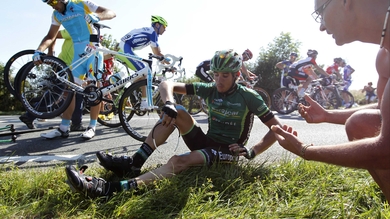
The route was much narrower, making matters much more technical for the teams. These changes made the Tour stage finishes more dramatic, but perhaps too much so given the sheer volume of accidents.
That said, bad luck must also be considered as one of the main reasons for the number of crashes.
Beyond that, one can point to the dark arts of the peloton as being the reason for so many spills and thrills.
Alberto Contador is not a popular man within cycling at present - due to the ongoing doping allegations against him - and there have been suggestions that he was pushed in one or two of the crashes he was involved in.
Mark Cavendish:
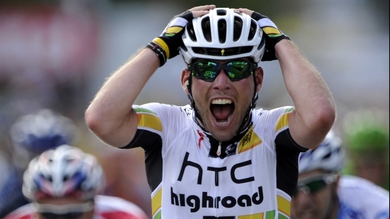
The 'Fastest Man on Two Wheels' has perfected the art of sprinting like no other and it is a joy to watch his superb HTC-Highroad team lead him out for his victories.
The technical finishes of this Tour brought new challenges to HTC-Highroad and they passed with flying colours.
Is Cavendish the best sprinter of all-time? Possibly. The odds are that if he can continue this winning ratio he will surpass Eddy Merckx’s overall stage wins record – of 34 – in the Tour.
There is a long way to go – and who knows where his career will lead – but it is achievable. As it stands, Cavendish has won 20 stages in four Tours. At that rate of success he will surpass Merckx’s record in three years’ time, at the age of 29.
Nicolas Roche:
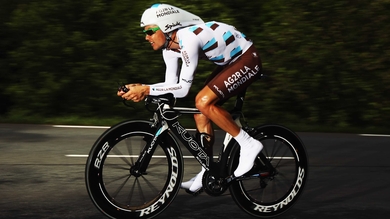
Ireland’s sole representative in the Tour had a disappointing time in the saddle. Roche managed to avoid all the early crashes and was well placed heading into the mountain stages, but he failed to deliver.
After stage 12 he lay tenth overall, but it was not to get any better, as he gradually slipped down the rankings to 26th.
The question marks that surround Nicolas Roche as a major GC contender are writ large. He failed to show he could live with the best of them in the mountains, being dropped far too easily; while his time-trial was poor by any team-leader standard.
Does he have it? Can he up his level and push on to be a general classification contender? His inability to stay with Cadel Evans, Contador and the Schleck brothers on the climb to Luz-Ardiden on stage 12 is a bad omen and points to the fact that Roche has plenty of work to do if he is to compete with the mountain goats.
Roche came into the Tour not fully fit and that certainly showed in the final week. He will get another chance in la Vuelta a Espana later this year – it will be an opportunity he will be keen to seize.
He was seventh in La Vuelta last year and it could be argued he is better suited to Spain’s Grand Tour.
Geraint Thomas and Bradley Wiggins:
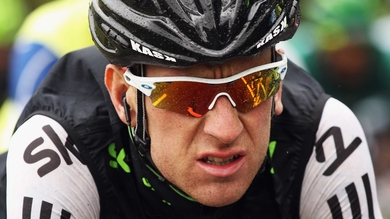
Following Bradley Wiggins’ early withdrawal through injury, Britain had lost its main hope in Le Tour. But Geraint Thomas showed that he might turn out to be an even better leader of the Sky team in a few years’ time.
Thomas’ attack on stage 14 was exemplary and showed he has the ability to attack the peloton on the toughest of climbs in the Pyrenées.
The Welshman is one to watch for the future.
Wiggins’ withdrawal was a frustrating moment for Team Sky. All the pre-Tour talk was of a man in the peak of his career ready to challenge for the maillot jaune in Paris.
At 31-years old time is running out for Wiggins and he will need to work incredibly hard in the off-season to hit the ground running next year. But Evans’ victory should serve as inspiration that there is still time left for Wiggins to win a Grand Tour.
Wiggins’ win in the Critérium du Dauphiné was an indicator that he could challenge for the Tour title.
After all, Lance Armstrong (2002 and 2003), Miguel Indurain (1995) and Bernard Hinault (1981), all won the Dauphiné before going on to claim victory in Le Tour.
Wiggins must cling to the hope that he can repeat this season’s form again.
Alberto Contador:
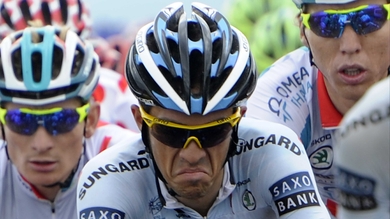
The three-time Tour champion – and my tip for the overall victory – never looked at his best in this year’s edition.
There are suggestions that Contador's poor performance is down to the fact he is no longer doping and that his involvement in crashes could be staged to enable him to use injury as an excuse for not being as strong as last season.
Theories will abound over this but none can be proved.
Personally, I think he was just too jaded from winning the Giro and didn’t have enough energy to combat the course with his usual vigour.
If Contador is found innocent of doping, I predict El Pistolero will not race the Giro d’Italia next year and mount a much stronger challenge in the 2012 Tour. He has already suggested the Giro will not figure in his plans next year.
Thomas Voeckler:
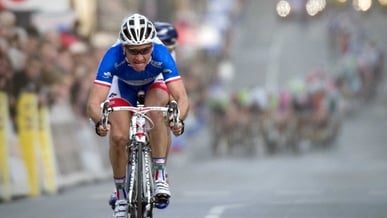
Without question the most value-for-money rider in this year’s Tour.
Voeckler became a national French hero over the course of his ownership of the maillot jaune. In 2004, he held the jersey for ten days and finished 18th overall; this time his ten days in the maillot jaune gave him a fourth-place finish overall.
If ever a rider deserved a place on the podium it was Voeckler, but that was not to be.
The defining moment of Voeckler’s Tour’s was on stage 18, going up the Galibier. Schleck’s superb attack on this most demanding of stages had left the field in his wake and forced Cadel Evans to up the cadence and pull the other overall contenders up to the summit with him. Voeckler clung defiantly to Evans’ wheel, before being dropped near the top of the mountain pass.
The Frenchman then managed to summon his last vestiges of power to up his own tempo and take back time from Andy Schleck in the last 2km. That effort allowed him to hold on to the yellow jersey, from Andy Schleck, by 15 seconds.
The pained agony on Voeckler’s face was one of the sporting images of the year so far.
Voeckler’s inability to time-trial with the best of them, and his implosion on the Alpe d’Huez, cost him a top-three finish. However, his iconic status in France is assured.
Andy Schleck:
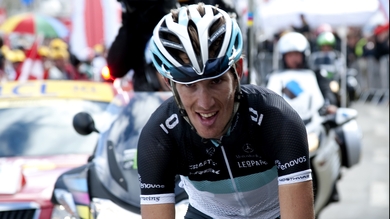
Andy Schleck may now never win a Tour. He has been beaten twice by Contador at the peak of his career and once by Evans in the twilight of his.
The eternal runner-up spot is a tag no sportsman wants, but some are stuck with.
At 26-years-old, Schleck has time on his side. One would imagine that Contador will come back to win one or two more titles, which would give Andy time in his late 20s and early 30s to claim a Tour.
The Luxembourger is a magnificent rider in the mountains, but his lack of strength in time-trials has now been proven as a giant weakness.
He must go into the off-season with renewed determination to improve this skill and go one better next time out. Another option for Schleck is to target a victory in another of the Grand Tours.
His only other finish in another of the Grand Tours was second in the Giro d’Italia in 2007. Perhaps he needs to get a monkey of his back by winning a Grand Tour outside of France, then come back to have a go at ‘le big one’.
Cadel Evans:
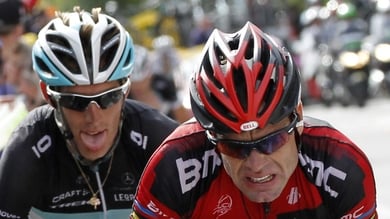
A worthy winner of cycling’s greatest prize. Evans, who was Tour runner-up in 2007 and 2008, had been ruled out as winner by many this year – myself included.
How wrong we got it.
His wins in the Tirreno-Adriatico and the Tour de Romandie should have pointed to his form, but his age and previous habit of bottling it when the heat was on made him a questionable bet. At 6s prior to the Tour starting he would have been a nice little earner.
His doggedness in the mountains and ability in the time-trial were the keys to his victory.
Evans' burst of pace on the ascent to Col de Manse and his descent to La Rochette dented the Schleck brothers’ aspirations and it showed up their serious failings in the descent, making it obvious they don’t perform as well in the rain.
A second Grand Tour victory would be the icing on the cake of a superb career. In 1998 and 1999, he won back-to-back Mountain Bike World Cups; perhaps he can emulate that feat with back-to-back Tours.
Where the maillot jaune was won and lost:
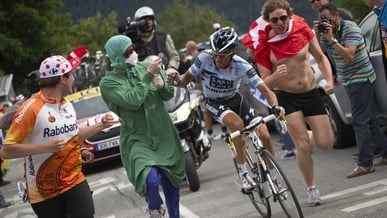
The Tour route was designed to ensure the Alpine stages 18 and 19 were where the Tour was to be decided and it almost worked out like that, with all of the Tour’s main protagonists – Voeckler, the Schlecks, Evans, Contador and Samuel Sanchez – within three minutes 15 seconds of the yellow jersey after stage 17.
Andy Schleck’s solo attack on stage 18 was one of the standout moments of the Tour. Schleck attacked on the Col d’Izoard and distanced himself from the peloton. He caught the breakaway riders and stormed up the Galibier to win the stage and move himself into second place overall – within striking distance to take the overall race lead.
But Evans’ resolute ability to cling-on and haul the chasing group up the Galibier on the Queen Stage was enough to keep him within one minute 12 seconds of the yellow jersey.
This was also the stage when defending champion Contador was dropped. The Spaniard finished 15th and three minutes 50 seconds down; at four minutes 44 seconds behind Voeckler overall, the defence of his crown was over.
Stage 19 brought the riders to the Tour’s most famous peak: the Alpe d’Huez. Prior to the Alpe the riders also had to scale the Galibier once more, only this time from the other – steeper – side.
Contador saw this stage as his last chance to make a mark on the Tour and attacked on both the Col du Telegraphe and the Alpe d’Huez, but he was eventually caught by Samuel Sanchez and Pierre Rolland, the latter going on to win the stage.
The main action was happening behind this; however, with the Schlecks chasing the leaders up the Alpe. Crucially for the general classification outcome, neither brother could escape Evans, the Australian sticking to their wheels and being sucked along.
At the summit finish Evans sprinted clear to finish fifth on the stage, ahead of the Schlecks in eight and ninth.
Voeckler imploded on the stage, and finished three minutes 22 seconds behind, giving Andy Schleck the maillot jaune.
With just 57 seconds separating the top three of the Schlecks and Evans it was all to come down to the individual time-trial on stage 20. In the ITT, Evans decimated the Luxembourgers, turning a 57-second deficit into a one minute 34 seconds winning margin.
The media had been spreading rumours that the Schleck brothers had been practicing their time-trials all winter and would hold-off Evans.
The fact the 42.5km ITT course around Grenoble was undulating was also likely to help the Schlecks. In the end their time-trial proved not to have improved at all, as Evans scorched clear.
The Schlecks must surely have known they were unable to compete with the Aussie in the time-trial discipline and must look back on stages 18 and 19, and their failure to put further distance between themselves and Evans, as the days when Le Tour was lost.

